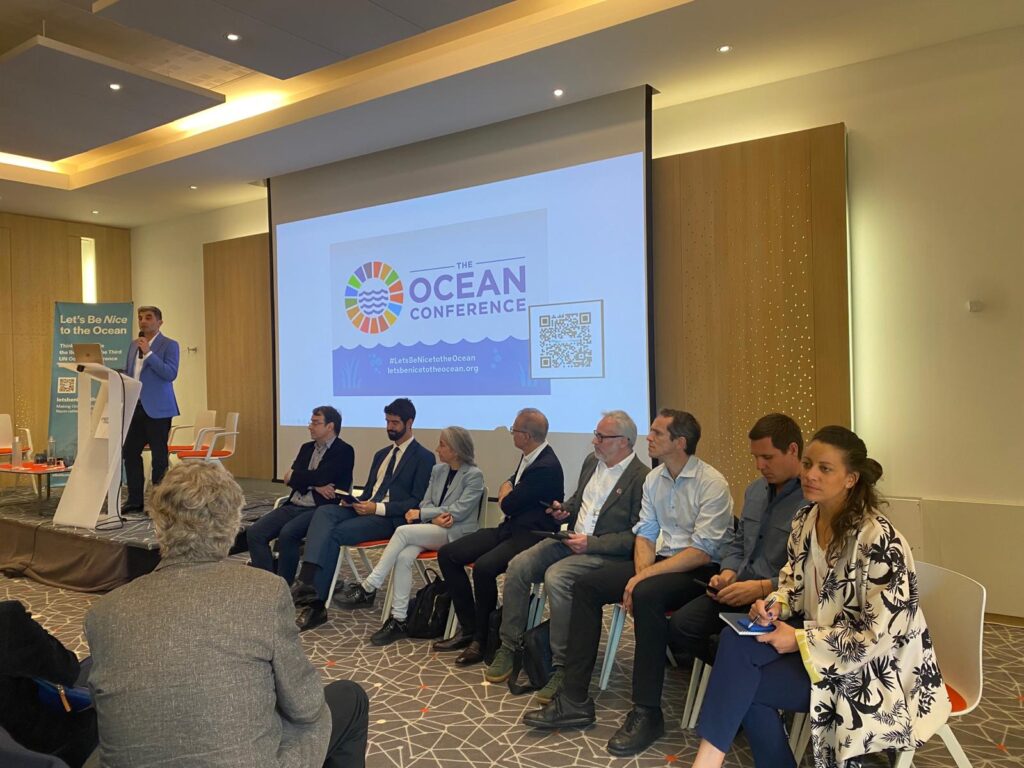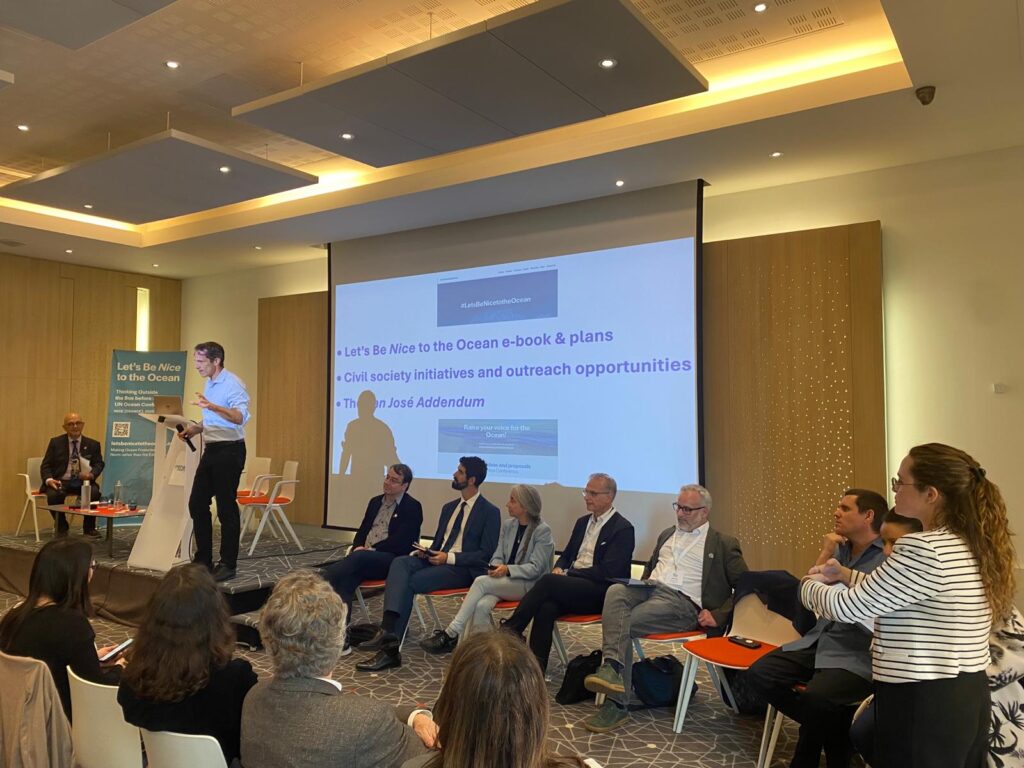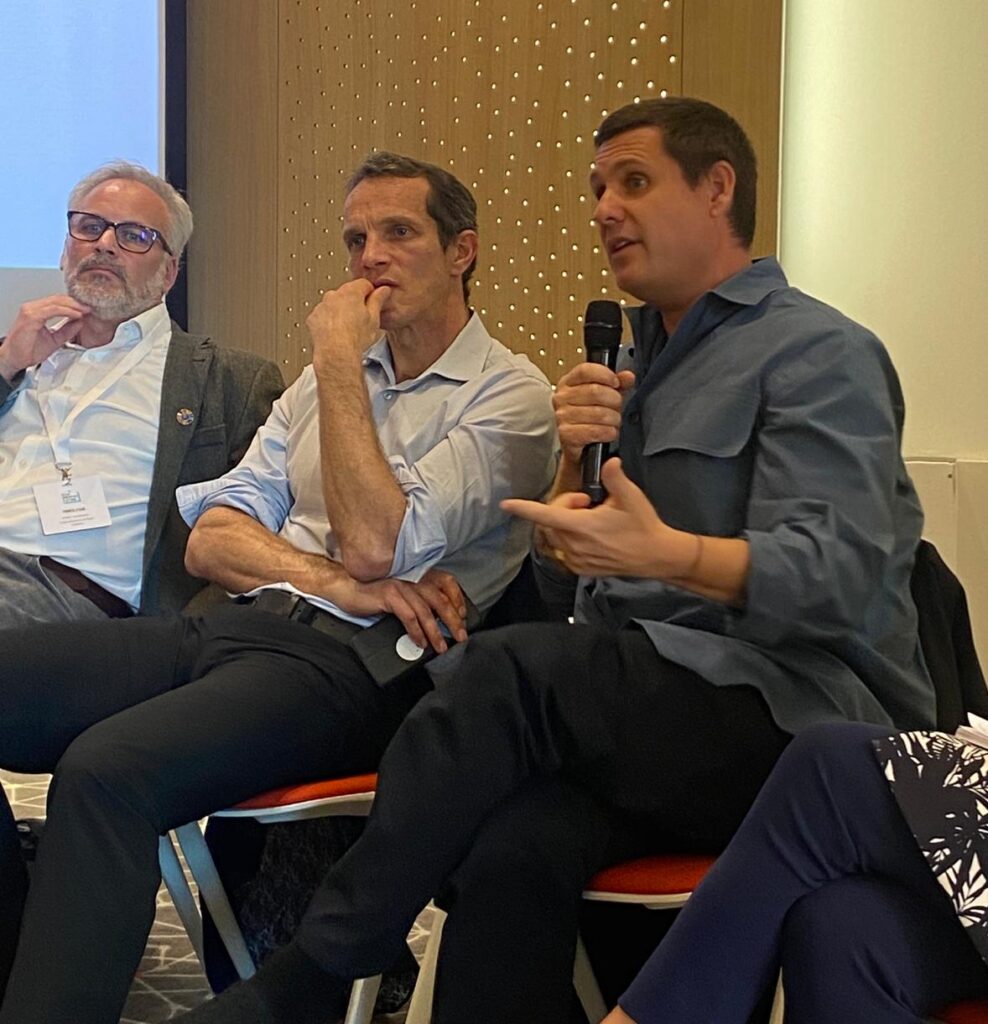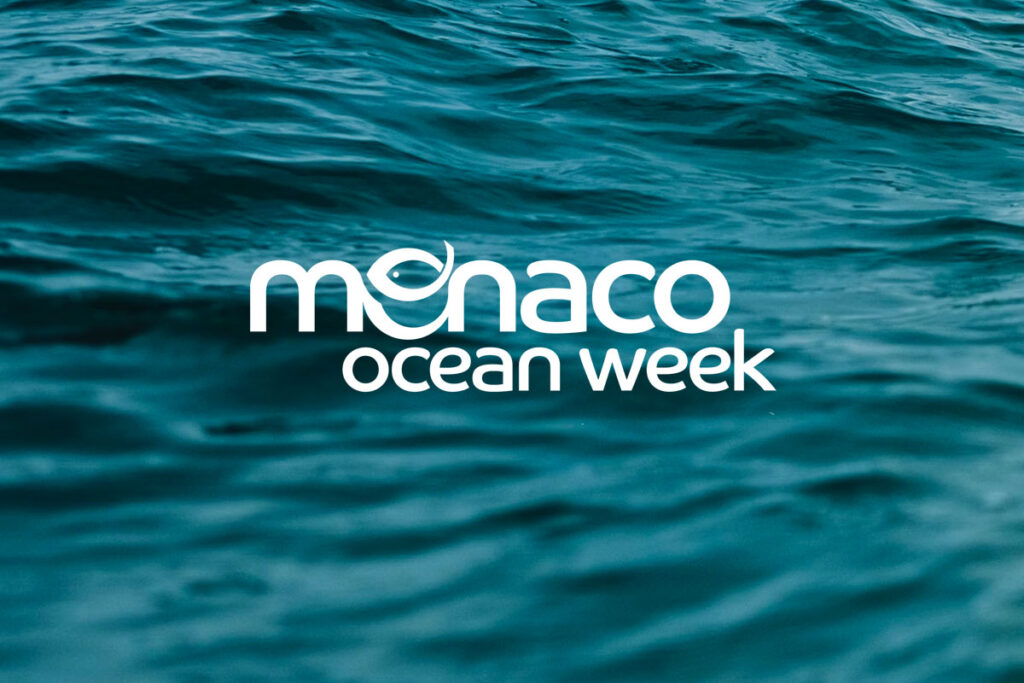An official event of the Monaco Ocean Week, co-organized by the Prince Albert II of Monaco foundation, the Let’s Be Nice to the Ocean roundtable took place in Monte Carlo on Wednesday 20 March.
The aim was to discuss the proposals contained in the Let’s Be Nice to the Ocean e-book published at the end of 2023, and the activities and plans in the run-up to the 3rd UN Ocean Conference in Nice, France in June 2025. Participants were asked to consider civil society initiatives and outreach opportunities, and next steps before, during and after the UN Ocean Conference.
Olivier Wenden, Vice-President and CEO of the Prince Albert II of Monaco Foundation, welcomed the audience and speakers in a packed conference room. He said that the Foundation’s support to Let’s Be Nice to the Ocean initiative was consistent with their mission to protect and conserve the environment, especially the ocean. “Making ocean protection the norm rather than the exception is very much in line with what we are all trying to achieve: let’s be innovative, let’s be daring, let’s be creative, let’s be strong and forceful”.

The event was co-facilitated by Rémi Parmentier, Coordinator of the Let’s Be Nice to the Ocean, and Loreley Picourt, Executive Director of the Ocean & Climate Platform. Both explained that the Let’s Be Nice to the Ocean initiative was initiated as part of the mandate they were given by the French and Costa Rica co-presidency of the UN Ocean Conference, to encourage and facilitate the participation of civil society in the run-up to the Nice Ocean Conference, and pursuant to a survey in which 125 NGOs worldwide took part, which was published in September 2023.
André Abreu, Tara Ocean Foundation, recalled the work accomplished since the Rio+20 Summit held in 2012 and the creation of the Ocean & Climate Platform prior to COP21 in 2015. He said there was a changing tide that now provides a more fertile space for ocean and climate protection, now ripe for new creativity, ideas and the transformation of Ocean governance: “We need more funding and inputs for the transformative proposal and innovative science that can support new ocean governance models”.
Purificació Canals, MedPAN, said that we need to work with nature, but also with people, and to pass and share knowledge to all stakeholders. As representative of an organization of marine protected areas managers across the Mediterranean region, Canals emphasised the importance of creating a permanent space for collaboration, that will respond to operational needs, benefiting from existing knowledge towards implementation: “This will be a key element for the future of ocean conservation and for communities in the Mediterranean and beyond”.
Vincent Doumeizel, Senior Adviser to the UN Global Compact, shared his vision for the development of the seaweed economy. Reminding that land food production had reached its limit, he argued that to transform our food systems and respond to multiple societal needs, seaweeds represent an important part of the answer. “Our planet is a blue planet, yet we remain in the “ice age” when it comes to sustainably utilizing our Ocean. Seaweeds provides many opportunities to respond to multiple crises, hence, preserving our algae forests and investing in algae farming for coastal communities and the food and other sectors is critical”. He called for a “seaweed revolution” necessitating more science, investment, and market regulation.

Mina Epps, International Union for the Conservation of Nature (IUCN) emphasized inclusiveness as central to our work: “We need multiple voices and perspectives”. She noted that in her view, not enough voices from Asia and the Pacific had contributed to the NGO survey last year. She said that “it is not too late to go back and make efforts and test new ideas to reach out to all the people we need to involve in this conversation”, and offered to engage the IUCN network in this endeavour.
Fabio Greco, Ocean Born Foundation, introduced his philanthropic organization and said that public administrations and governments must stimulate better innovation and private investment. He pointed out that the private sector is waiting for the right signals from governments and expressed hope that the UN Ocean Conference could provide this opportunity.
Guillermo Ortuño, marine ecologist collaborator with the Let’s Be Nice to the Ocean initiative warned that despite past conservation milestones, migratory biodiversity is plummeting. “Current regulations are falling short of their specific needs and there is a need for urgent action; migratory species do not have 10 years and we must continue and increase targeted action towards their protection”. He said that the 30×30 agreed target alone will not suffice to guarantee a safe and equitable future for migratory and straddling biodiversity.
Markus Reymann, TBA21 Academy, at the crossroads of art and ocean science and engaging with several knowledge systems– including scientists and indigenous knowledge holders, said that art should not be considered an afterthought. He was however encouraged that art was starting to be viewed as a means to communicate and provide answers. “We aim to (re)connect ocean-nature-people, if there was ever a divide. The past 40 years have shown that knowledge is not necessarily what triggers action, but rather empathy that creates meaningful pathways to action”.

Francis Staub, International Coral Reef Initiative said that coral reefs, hosts of 25% of marine biodiversity, have been very nice to marine life and ocean and coastal communities. He said that now 30% of coral reefs are within marine protected areas, but that we need way more! Reviewing the five initial flagship proposals of the Let’s Be Nice to the Ocean initiative, he emphasized the relevance of coral reefs for all of them. “Zero discharge targets in coral reef areas are non-negotiable, we absolutely need them. Let’s do more!.” In his view, international legal instruments for coral reefs protection are needed to address all drivers of coral loss.
Several people in attendance contributed to the conversation. A delegation from Besign, an international sustainable design school headquartered near Nice, emphasized the ambition of young designers and youth at large. They explained that they were developing a project to reach out a large international network of design schools in the run-up to the Nice UN Ocean Conference next year.
A representative from the Zoological Society of London said it was important to “find, fund and mentor the right people coming from a more diverse world that currently nurture”.
An endurance swimmer from Switzerland announced that this summer he will attempt to swim through the entire Pelagos marine sanctuary area between Italy, Monaco and France to raise awareness and promote the message that whether we live near or far from the coast, everyone’s future is dependent on a resilient and living ocean.
A representative from France’s Office of Biodiversity announced her organization’s open consultation which is complementary to the Let’s Be Nice to the Ocean initiative, taking into account the targets of the Sustainable Development Goals which she believed need to be updated; she also referred to the fact that next year will mark the 50th anniversary of the adoption of the Barcelona Convention for the Mediterranean, with opportunities and risks also outlined in the Let’s Be Nice to the Ocean e-book, and the tenth anniversary of the Paris Agreement.
An ocean advocate based in the UK addressed the protection of global systems and the conservation of “special systems”, including the deep sea and the cryosphere, especially in the Arctic.the Arctic.
This series of interventions ended with a former high level EU Commission representative, who asked what the plans were to bring the Let’s Be Nice to the Ocean initiative proposals to the plenary of the 3rd UN Ocean Conference. In response to that question, the roundtable facilitators said that conversations with the co-presidency of the Conference are ongoing, and to begin with, there will be a special side event at the Immersed in Change high level conference organized by the Government of Costa Rica in June 2024, exactly one year before the Nice conference.

Dr. Sylvia Earle, Mission Blue and Explorer-in-Residence of the National Geographic Society, shared some closing remarks. She said that in the span of her lifetime, she had been a witness to unprecedented changes to Nature and the Ocean, describing it as “this blue miracle” and expressing gratitude for the privilege of spending time in it. Earle highlighted how in the 1950s, 1960s, 70s, and 90s, we used to be convinced the ocean could never be depleted. “But look at where we are today,” she pointed out, “Humanity has flourished and grown, but while we dominate the planet, it doesn’t mean we are in charge”. Our prosperity, Earle emphasized, depends on “understanding where we fit in, and on how we treat our blue planet.” She cautioned that “we seek to terraform Mars, yet we ‘mars-form’ Earth.” Given that “we still have a choice,” she stressed that “the magnitude of our ignorance is our greatest discovery,” urging us not to squander our chance to understand the miracle of the Ocean.
